「宗貞と吉子 僧正遍昭」 (Munesada to Yoshiko Houshi Henjou)
“Munesada and Yoshiko – the Monk Henjou”
To be or not to be – that is the question. This was my favorite episode, but I’d be a liar if I said this episode didn’t make me rage… massive tl;dr ahead.
Poems aside, on an emotional level this episode didn’t grip me in the same way as the last two did, and part of it is the pitfall of trying to adapt a full love story into twenty-something minutes. Yoshiko (Endou Aya) and Munesada’s (Uchida Yuuya) tale had all the essential elements – the beginning, middle, and end. I do appreciate it on several different levels, especially the attempt to portray Yoshiko’s avant-garde thinking and her desire to find happiness on her own terms. It’s certainly a bold thing to say for a woman of any long-gone time period, and it’s always been emphasized in ancient cultures that a woman’s place is within the home, tending to her family. While it’s almost an outlandish notion that would incite endless rage in feminists, that way of thinking was the norm during those times, and anything else would have been considered heresy. Well, perhaps that’s quite the harsh word… but the fact of the matter is, it was an uphill struggle for women to be defined by anything other than whose house they were born into and after marriage, who their husbands were. It was simply much easier to get married and have a family. No matter how boring or unfulfilling that would have been, the fact of the matter is that for women of Yoshiko’s status, marriage brought stability.
Now, I really did appreciate the show’s attempt to give Yoshiko a desire to become her own person and how that created an irresolvable conflict with Munesada. Of course the key word here is “attempt”. It’s a rich layer of conflict to explore – the role of women in society, the issue of chasing self-fulfillment as opposed to familial happiness. The olden day version of self-sufficient career woman being pressured to marry and have children, if you will. The only issue with Uta Koi‘s rendition is that Yoshiko simply is not cut out to carry out that conflict. This love story should have made both sides equally sympathetic to the audience, molding their core problems in such a way that when they part, the audience should have had tears in their eyes – a woman who wants to go beyond her time and seek happiness on her own terms, no matter how harsh that road might be, and the man who gave her up so she could chase her dream. That sacrifice should have been gutting, because it’s big.
Munesada knows the palace life in a way Yoshiko does not, and he knows the difficulties she will face. But most of all, he loves her – that’s what enables him to make that sacrifice, to let his own happiness go so she can live the way she wants. Sure, it seems like what any sensible, loving man should have done, but that’s taking Munesada’s actions for granted – it was not out of his place to tell Yoshiko to stay at home and play house. It’s frustrating to hear at first, but his way of thinking is mostly dictated by the societal norms of that time period, and another issue that might have been lost in the shuffle. He makes frequent references to her beauty, and how that will attract the men in the palace. I don’t claim to be an expert in history, but it’s pretty easy to make the inference that there will be some leering and possible sexual harassment involved once a woman enters the palace grounds. This is further compounded by the tidbit Munesada’s grandmother was a servant, not a consort/queen/etc. Once in the palace, Yoshiko would have lost her identity on some level anyway – to Munesada it becomes the question of letting the woman he loves do what she wants but be perceived as an object and leave her to that misery, or giving her what he can by treating her as his wife but keeping her like a bird in a gilded cage. It’s almost easier to sympathize with his plight – whether or not he would have been unfaithful is another question, but if he loved her enough to give her up, it’s no stretch to say he would have given her a very good life.
(Rest under spoiler tags for brevity’s sake)
Show Spoiler ▼
It’s unfortunate then, that Yoshiko is so lacking as a romantic partner that all of Munesada’s troubles seem completely wasted. It’s admirable for her to have dreams, but it just did not come across properly – her words felt shallow at best, because while she had the right idea and the stubbornness to see her dreams through, it really felt like she just had no idea what she was getting into. This is where I have to fault Uta Koi for not carrying out her character properly. Grounding her reasons for rejecting Munesada to her desire to become her own person is perfectly fine – lauded, even. It’s grand, dramatic, and it’s a perfectly legitimate reason to sacrifice her love. But linking her rationale for rejecting Munesada to her wanting to make a name for herself? It’s a dangerous gamble to make, because now her desire to just live as herself is worded in a very divisive way: is she being independent, or is she being immature? Her claims of wanting to improve herself in poetry is almost always overshadowed in some way or another, and it’s really not doing her legacy as one of the best Waka Poets any justice. There was never really a very clear, no-arguments distinction of whether or not Yoshiko’s motivations were based on a true desire for personal growth, or just a simple desire to be famous. What really clinched her character for me – in the worst possible way – was that she entered the palace as one of the Emperor’s brides. It’s largely the show’s fault, since that ending is just too fantastically ironic and infuriating to be possible. She rejected Munesada on the grounds she wanted to find her happiness on her own terms, that no matter how difficult things would be, she wanted that right to go her own path in the palace. The episode spent precious minutes building up Yoshiko’s character to be an independent woman with feminist notions eons beyond her time, yet in the end it all comes down to the man she marries. Why then, was she and Munesada forced to part? If she was going to have to depend on a man to fulfill her dreams in the end anyway, why not just do that with a man she actually loves?
To put it simply, it all feels like a waste. It really leaves a bitter taste in my mouth knowing that for all those idealistic dreams and desires Yoshiko had, it all falls back down to becoming one of the Emperor’s brides. Is she happy being one of his many consorts? Who knows. Her legacy as Ono no Komachi is certainly something to behold, but the episode does not even portray how she got there – that almost makes it worse because there’s nothing to connect that incredible success to anything. What about it? What about that title? By juxtaposing her identity as the legendary poet to her identity as one of the Emperor’s brides as the show did implies the two are connected somehow, and that just doesn’t sit right with me. For the love that she lost – for the love Munesada gave up – I wanted her to succeed on her own terms. Unfortunately, there’s not even that morsel of satisfaction to go around. It almost would have been better if they left it out completely, because as it stands, the honor Yoshiko has as Ono no Komachi is just utterly wasted here.
Now, for the requisite poetry analysis:
Show Spoiler ▼
Let the winds of heaven
Blow through the paths among the clouds
And close their gates.
Then for a while I could detain
These [heavenly maidens]. (Ogura Hyakunin Isshu 1, 2)
Frustrating love story aside, this poem is beautiful, the emotion behind it heightened by the parting of the two lovers. The image of the heavenly maidens is actually quite widely used, and the metaphor extends beyond Japanese culture. As divine, ephemeral beings, the beauty of these maidens is a sight to behold, and laying eyes on them on Earth is an even rarer phenomenon. The desire to hold on to such pleasing aesthetics is used to describe the impressiveness of Yoshiko’s beauty here, and the implication here is that Munesada finds her loveliness on par with something from the realm of the gods – a hefty comparison to make, but one that truly emphasizes how precious he finds her. He’s imploring the greater powers to intervene in line 1, commanding the “winds of heaven” to delay the inevitable. This plea is what gets the message across, even more than his comparison of Yoshiko to heavenly maidens. Line 5 is a beautiful image on its own, but it is simply a magnification of Yoshiko’s beauty and by itself it is not powerful enough to carry the full weight of the poem. It is the lines that come before it that lends a true sentimental aspect to the poem, because those are what convey Munesada’s earnest desire to prolong his last meeting with Yoshiko.
There’s a sense of helpless melancholy that settles in as it becomes clear the poem is meant to describe a painful parting. After all, what is one man to do against the forces of the heavens? He cannot do anything but watch as things proceed the way they are meant to. The word “detain” enforces the sense of “unnaturality” – meaning how Munesada’s desire to hold onto Yoshiko seems to go against the “natural order of things”. “Detain” is typically used to keep somebody from doing something, to delay something that must happen, and consequently, it does not have an entirely positive connotation. Using it in conjunction with the image of “heavenly maidens” then creates the impression that Munesada is being selfish by almost “trapping” them on Earth, since the heavens are where those maidens belong. It’s an excellent way to portray his love for her, where his yearning to subdue her desires is recognized as selfish by the diction, yet his earnest feelings for her are carried across by the use of the divine imagery that lets the audience know he recognizes their parting as inevitable.
Full-length images: 1, 3, 5, 8, 10, 12, 15, 17, 18, 22, 23, 24, 26, 29, 30.
Preview
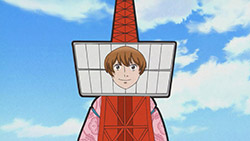
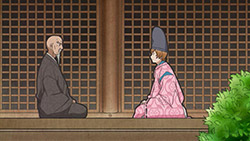
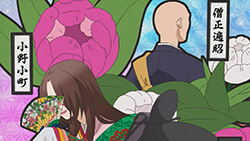
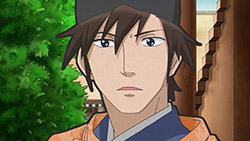
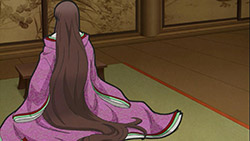
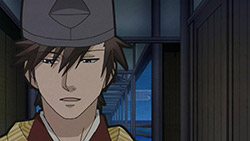
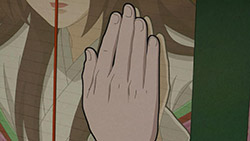
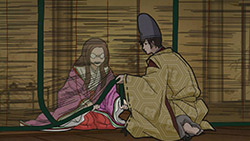
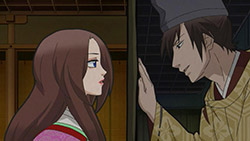
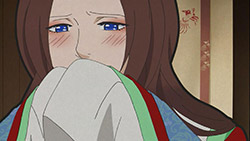

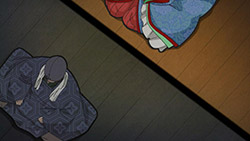
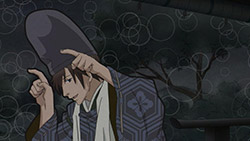
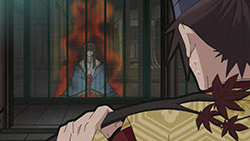
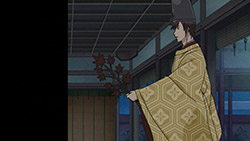
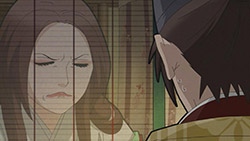
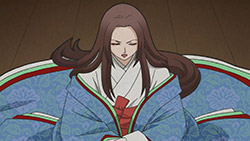
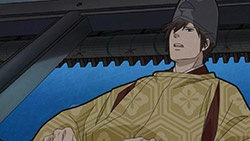
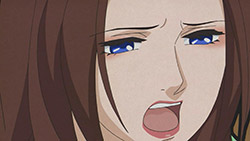
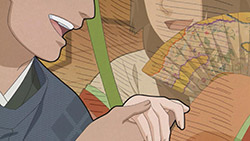


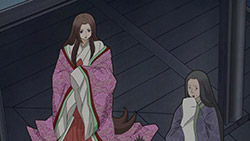
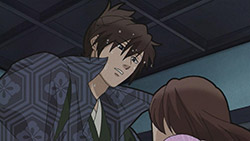
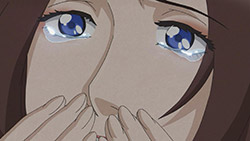
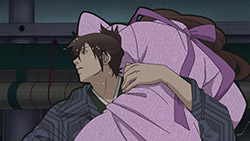
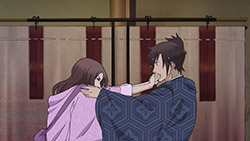
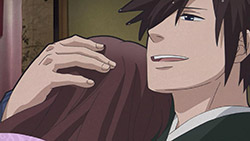
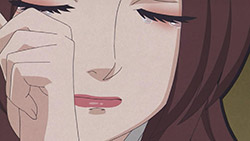
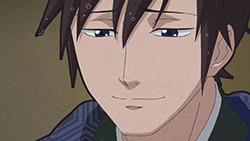
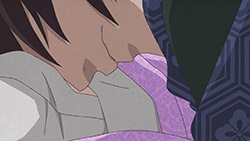

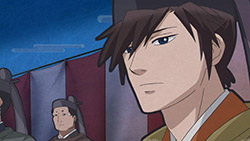
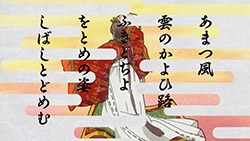
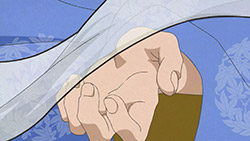
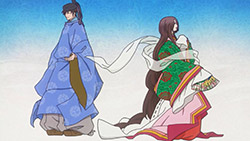
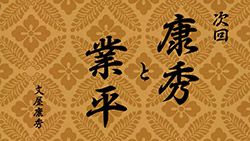

Wich is better: the show or the opening?
( in case you’re wondering the answer is: neither, they’re both great)
So nice to have a romance anime mature adults.
This too, was my favorite episode, but I actually didn’t find her portrayal to be as negative as you did, or that the story was wasted potential. Don’t get me wrong, I still love your writing and your post!
A very good life by anyone’s standards, yes, but for her, Yoshiko made it really sound like a life where she was free to pursue her dreams, even if she might be looked down upon and suffer, was an even better life than any she could have with Munesada.
It does seem immature in that Yoshiko doesn’t exactly know what she’s getting into, but I love the idea of a dream that is a little immature in some way. I would probably even argue that a little immaturity, a sense of uncertainty, is required for a dream to be truly a dream.
Unfortunately, I don’t know enough about imperial palace life to say if ‘famous’ and ‘importance’ are actually seperate, but I didn’t equate her desire to become important with a desire to be famous, because for me, ‘famous’ denotes pure popularity, while ‘importance’ has a connotation of usefulness. After Munesada asks Yoshiko if the reason she wants enter the palace was to become important, she says that it’s not that simple because she also wants to fulfill her true potential, to use all her knowledge. I thought that was actually a very “clear, no-arguments” distinction of why exactly she wanted to become important.
I thought that she had to part with Munesada because if she married him, she would never had her dreams fulfilled because he would have forbade it; he was stubborn to the end, just like she was. If she came into the palace as one of the Emperor’s brides, she would still have a chance at realizing her dream. It is sad that her future success as a poet had to be tied to her becoming a bride, but I don’t think that her dream would have been fulfilled with Munesada. =(
My takeaway from this episode was that in the end, Yoshiko did have a sacrifice to make: a married life with Munesada. And in doing so, she would have made an even bigger sacrifice: her dreams. For me, I would have probably had cried man-tears if she had chosen Munesada over her dreams, just because that potential sacrifice meant so much more to her (and to me) than sacrificing a love.
Maybe a love wasn’t truly meant to be, if one cannot choose love over one’s career, or one’s dream…
Massive tl;dr, so spoiler tagged. Apologies in advance if not everything is coherent – being half-asleep does wonders to kill brain power 😛
Show Spoiler ▼
Bakamochi, it’s Ono no KOMACHI not Ono no KANOCHI.
This story deserved to have a full episode rather than half. It is sad to think that they did not get together but she got what she wanted to be a great poet (She was included in the six best waka poets which was compiled Tsurayuki, the tokyo tower man). Also, for me, dreams weigh greater than love. Should she married Munesada, though she’d be happy by his side, she’d still feel hollow since she would have no opportunity to fulfill her dream as Munesada wants to cage her. She does not want to be caged. Yeah, women are supposed to be in inside the house making sandwiches that time but if you’re in Yoshiko’s shoes, you’d feel that there’s something missing. Making her a bride of the emperor would give her a better a chance. Moreover, she’s likely influenced by the notion that Japan had an impress which was briefly mentioned in this episode. So, she likely thought that she’d have a chance if she’ll enter the palace.
This story might be better if it was given 2 episodes or if it explored Yoshiko’s point of view more. Uta Koi fairly fills the void, for me, of lack of good romance last season (I watched 10 – 14 series, but did not find a good romance. I mean, a romance anime). Now, I want to go and read the manga. I don’t mind being spoiled hahaha
I have a question. Is Yoshiko’s poem in this episode also included in Hyakkunin Isshu because she’s included in it as Ono no Kamochi but I don’t know what is her poem there? Maybe you know it. Thanks 😀
Hahaha there’s something wrong again in my post.
This story deserved… -> This story REALLY deserved…
Sorry about that. Just full of stress due to my last year in college. It’s kinda ironic that I often commit errors in my replies though my research paper is about computational linguistics. Lol XD
Derp! Fixed – thanks for pointing that out! Lol you’d think I’d have it straight after three watches OTL
Glancing at a list of poets in the Hyakunin Isshu, she is there, but her poem doesn’t seem like it deals with love (it’s about beauty disappearing with age LOL), so I’m not sure if it’ll make it into the series 🙁
Okay, i have (for your eyes, a dump) question. Whats with this Hats in Ancient Time? Is it some kind “introduce” from China at that time? And what are they for? Some kind of Status? Rank? or “my head is so big as my little men?” 🙂
Hope someone enlighten me. i am curious about this part of Japan/Nippon History
The hats are called, “Eboshi”, used to sort people into ages and social rank.
Aristocrats used to wear them regularly at work, while the others used to wear them only on special occasions.
Also, I must add the historical truth about Ono no Komachi. Even in the latest research, no one can tell exactly how she looked like or her true personality. From what we know, Komachi was an Emperor’s beloved mistress whose regime ended suddenly due to political coup’d’etat. She was very proud, clever, and beautiful woman. She is considered to be the most beautiful woman ever in Japanese history. Because of her low social rank, she was ranked the lowest in the mistress hierarchy.
After the sudden coup’d’etat, she had to leave the court. Some say she lead a very peaceful and quiet life. Others say she died very lonely and penny-less.
Show Spoiler ▼
This is so far I know from my poor high school study in Japan…
Your comment’s very informative..I guess it’s kind of comforting that at least her poetry has been passed down the generations, so in some way her dream did not completely go under like her political career. Otherwise this would’ve been an extremely heartbreaking episode.
Thank you for your Answer
Domo Arigato
I do not exactly understand why one isn’t allowed to be a poet while staying at home as a housewife. All those free time she has would be a great time for all kinds of creative activities. Or why the guy wouldn’t allow her to be a housewife poet. Just keep her away from the dangerous palace. Or does a poet have to frequent the palace now? I couldn’t imagine a country so backwards that literary circles wouldn’t have their own gathering spots.
And no, I do not sympathize with her non-existent plight at all. Great writers and poets have always existed. Some were beggars, housewives, or just monks living in the mountains. Yet their works passed on because of their own virtues, not because they had to appease the ruling powers or marry an emperor. As it is, I could only see her as a woman that craves power and social status. She could have tried to work something out with the man she claimed to have loved for so long. The resolution here is just cheap and materialistic.
I don’t think it was just about being a poet. I think it was about expanding her horizons and being able to learn new things. I think what she could do as house wife was very limited.
I really can see what you’re trying to say. From what I see in the Anime, I can easily relate her as high esteemed and a little arrogant person.
However, let me just point out that the marriage life at those time is very different from what we have today.First if a man visits a woman 3 times in a row, that man is permitted to see the woman’s face and marry her. (In Yoshiko’s case, she purposely made it 100 days.)After the marriage, the couple cannot live together-wife stays indoor all day, husband sleeps in a separate house and only visits his wife occasionally when he wish to make love. Husbands were allowed to have as many wives as they wished. Also, after marriage, most housewives were trapped indoors and forced to have very little contact with people other than their husbands. So, many married women had spent their lonely days mostly waiting for their husbands to return.
To me, it seems like a very tiring life, indeed.
In my opinion, Yoshiko might have wanted to be an independent woman, making her own way in life. (Though she partly depended on the emperor for her family’s wealth and social status)
She might have known such passive lives of married women and had sought to test her talent in the real world by interacting with various people inside the palace.
Giving up her true love for her esteem may sound foolish and immature. But she was young (I hear she was about 18), and I know what girls are like in that age- they want to see the real world.I can imagine Yoshiko being excited to experience the brand new life in the palace.
Wow that sucks lol
But I still don’t know – even in the palace, she is still a woman and she is still someone’s wife – the Emperor’s wife. Aren’t they expected to conduct themselves differently than they would be expected if they had married a non-imperial man? I can’t imagine they would be allowed to freely discuss poetry/political/other matters if women were already worth so little during that time period.
I get that marrying Munesada wasn’t the right path for her – that’s not the primary issue I have. I’m just having a difficult time understanding what exactly marrying the Emperor did for her. Sure she’s in the palace now and there are a lot more opportunities to learn, but who’s to say the role of women in the palace is any different than outside of it? It’s harder to make sense of this because I still have no idea why she wanted to go to the palace – what exactly did she want to learn? If one takes into account the little tidbit at the beginning of the episode and her childhood desire to be someone like the Empress, then one can assume she had political machinations, which would make a lot more sense than just wanting to practice poetry. But in the end, you really can’t be too certain just what she wants to do.
Hmm… I sound like I’m beating a dead horse x__X (my tl;dr reply to verdant is a longer rehash of what I said here), so I’ll leave it at that.
I can never tell the reason why she chose Emperor over Munesada, because the Anime changed the story ending.
Show Spoiler ▼
Also, I can imagine that it was very difficult for a daughter of a politician(or lower aristocrat) to repel her father’s wish to be married to an emperor and bring prosperity to the family. In those days, power meant everything in politics. If one marries an Emperor and have a child, her family would gain so much power in politics and earn great fortune. In other words, marriage to an Emperor had been the only hope of big promotion for families in Heian-period.
So should Yoshiko refuse her family’s wish and get married to Munesada, I bet she got renounced by her father for being disobedient.
Munesada loved her and she loved him. He would have given her a good life and treated her well but that is not the life she wanted to live. She wanted more from life than being loved and cherished and protected as his wife. She wanted to expand her horizons and her knowledge.
I think the episode made it very clear that as Munesada’s wife she would have been limited. In the palace even if her life would be difficult she would have way more opportunities to learn and expand herself. Munesada loved her but he saw a woman’s role as only one thing, Yoshiko saw it as something more.
Yoshiko didn’t mind that her life would be hard because she had a dream she wanted to pursue, in the end Munesada truly showed how much he loved her by letting her go and letting her pursue this dream.
Also though I was not familiar with Ono no Komachi until looking her up on wikipedia. I expect the intended audience though would very much know who she was. I don’t think the series needed to show us how she accomplished her dream, I think it was enough to show us that this dream was not in vain and the name itself tells us this.
I liked this episode the most so far, but I may be biased because I love Endou Aya. I get what you say about how I wanted the characters more fleshed out. Like I wanted to see at least a LITTLE bit of what happened to Yoshiko once she went to the palace. Like how she was happy and realized her dream and became a famous poet. Instead of just telling us at the very end.
to Fuu,
I think the ending is appropriate as the poem is dedicated to Munesada… while Ono komachi herself had a poem in the hyakuninn ishhu. So let’s just wait for her part….for I too want to know whether she is happy once becoming the Emperor consort.
The sub is simply wrong.
She said she wanted to shine in her own life. なお輝く(nao kagayaku)=still shining.
But the subbers took なお(nao) as 名を(na wo)=make her name known.
So your rage is somewhat groundless.
To be precise, it’s Munesada who says she wants “to make her name known”.
I think you looked at one line of my post and assumed I was raging about her being materialistic, but that was not the point I was trying to make and I think I was pretty clear about it.
If I remember correctly in chihayafuru Kana-chan said that poetry was something that only the royal court could participate in… in other words her dream needed her to be in the place to be fulfilled.
Also when at the end they let us know that she is Ono no komachi it was to let us know that Munesada’s sacrifice was worth it as she did fulfill her dreams, also for what wikipedia let’s me know next chapter will feature her again alongside with narihira an the other guy mentioned in the preview since those three seem to be connected. So probably next chapter will show us how she made her way up.
I think that’s wrong since there were monks who became popular waka poets. E.g., Kisen, a Buddhist monk, is one of the 6 poetry immortals by Tsurayuki (the Tokyo tower guy).
I’m pretty sure that it had to be one of the only ways for her since she is a woman.
Yeah, I have nothing against that.
I was referring to this line of yours:
Maybe there’s something missing in that line of Kana-chan.
Sorry, if I was vague.